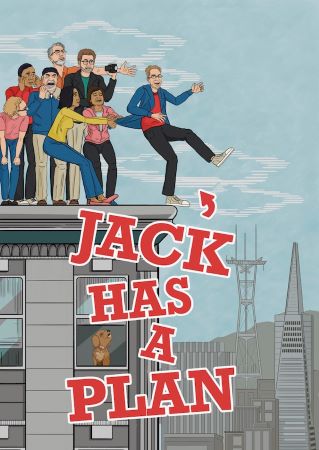
Jack Has a Plan 2022
Distributed by The Video Project, 145 - 9th St., Suite 230, San Francisco, CA 94103; 800-475-2638
Produced by Chris Metzler
Directed by Bradley Berman
Streaming, 73 mins
High School - General Adult
Documentaries; Ethics; Health Sciences
Date Entered: 03/13/2024
Reviewed by Jennifer Dean, Film Editor, Filmmaker, Film CuratorIn 2016 The California End of Life Option Act (EOLOA) made it possible for terminally ill patients in California to receive drugs for physician-assisted death. The right to die with dignity has been explored by numerous physicians and journalists - perhaps most famously and controversially by Dr. Jack Kevorkian, a United States physician who was tried in court repeatedly for assisting in suicides and given the moniker “Dr. Death” in the late twentieth century. Recently, the subject was explored in-depth by journalist Katie Engelhart in her book The Inevitable: Dispatches on the Right to Die, in which she interviews physicians and patients from Europe and Australia as well as North America. Jack Has a Plan documents the life and death “plan” of lead subject Jack Tuller in California by his filmmaker friend Bradley Berman. It is a very personal and close-up look of someone with a brain tumor deciding to end life on his own terms.
Despite the heavy nature of the subject matter the filmmaker attempts moments of levity with old black and white archival footage and a jazzy score. The archival footage often feels out of place and undercuts the subject, which may have been the intention of the filmmaker who, according to the film, somewhat reluctantly records Jack’s journey. Director Bradley Berman, who also served as editor along with Quinn Costello and Byron W. Thompson, inserts himself into the film as documentarian. Berman explains through direct address to the audience that he was convinced by the main subject Jack Tuller to begin filming after the recurrence of Jack's brain tumor. Berman shows himself going through boxes of material (videos and such) from Jack’s younger, healthier years. He presents a clip from one of Jack’s music videos and uses footage from his wedding in the film but otherwise fails to incorporate much of this source archival footage. The audience cannot help but wonder what is contained in all of those boxes and what stories could be told, which would be an interesting question to raise in a documentary class.
Berman barely touches on the complicated process of the California End of Life Option (EOLOA) outside of a small scene with health officials as they provide Jack with the drugs needed and a few scenes with palliative care specialist Torrie Fields who helped to enact EOLOA in California. The scenes with Fields are not traditional interviews but mediated through Jack. It is, after all, Jack’s plan - and Berman as documentarian seems somewhat hamstrung by Jack as subject.
Additionally, Berman chooses not to expand on the ethical dilemmas associated with the decision and does not really dwell on Jack’s health deterioration. Jack’s wife is featured prominently in the film and is an incredible asset to Jack throughout the process - and to the film viewer, in terms of navigating what the film does not explicitly depict.
There is something performative and deliberate about Jack’s appearance in Jack Has a Plan which is reminiscent of Jason in Shirley Clarke’s 1967 documentary Portrait of Jason. Quite different from the famous Maysles brothers’ cinema vérité exemplified in Grey Gardens or Salesman, this is a film heavily mediated not only in the edit but also onscreen by the filmmaker and the subject. Despite the clear conclusion of the film, it is a documentary that raises many questions without providing many answers. I would recommend it for a class on documentary filmmaking but due to the limited scope it would not necessarily be sufficient for a class on health policy or bioethics.
Awards:DC Independent Film Festival, Jury Award, Best of Fest Award; Oneota Film Festival, Jury Award, Best of Fest; Boulder International Film Festival, Jury Award, Impact Award; Dances with Films (LA), Jury Award, Best Documentary; Alameda International Film Festival, Jury Award, Best Documentary Feature; Mystic Film Festival, Jury Award, Best Documentary Feature; Oceanside International Film Festival, Jury Award, Best Documentary Feature; Atlanta DocuFest, Jury Award, Best Documentary Feature; The Poppy Jasper International Film Festival, Jury Award, Best Documentary Feature; Newburyport Documentary Film Festival, Jury Award, David Kleiler Cinephile Award; San Luis Obispo International Film Festival, Jury Award, Best Feature in Central Coast Filmmaker Showcase; Calgary Underground Film Festival, Audience Award, Best Documentary Feature; Lake County Film Festival, Jury Award and Audience Awards, Best Documentary Feature; DOCUTAH International Film Festival, Audience Award, Best Feature ; South Georgia Film Festival, Jury Award, Best Documentary Feature; Twin Cities Film Festival, Jury Award, Best Documentary Feature Finalist; Ojai Film Festival, Jury Award, Best Documentary, Honorable Mention; New Jersey Film Festival, Jury Award, Honorable Mention
Published and licensed under the Creative Commons Attribution 4.0 license. Anyone can use these reviews, so long as they comply with the terms of the license.